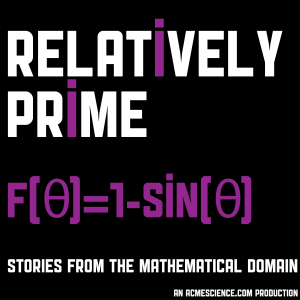f(θ)=1-sin(θ)
Relatively Prime: Stories from the Mathematical Domain 2018-03-10

f(θ)=1-sin(θ)
If you ever want to conduct a quick social experiment on the status of mathematics in the world just get yourself a dating profile and mention on it that you are a mathematician. The messages you get will be quite illuminating:
“I hate to break it to you, but while I appreciate math for its logic and beauty, I don’t think I’ll ever like it. lol TOO many formulas.”
“I got up to AP Calc during my senior year of high school, cheated off my best friend on all the tests and still got 70s in the class, and swore off math from thereon.”
Even when people do not say outright that they despise math the contents can leave a bit to be desired:
“I’m awful at math but it fascinates me–much like historical linguistics and conjugating Russian.”
It is not like it was all bad though. Samuel did once get this message:
“I also really like math and spend a lot of time trying to figure out how to get people to like it more!”
But come to think of it he doesn’t think they actually ended up actually going on a date.
We really shouldn’t be so negative about all of this. Samuel has been told by more than one person that being a mathematician makes him sexy, really he has and it is so validating for him, and he doubts anyone ever turned me down for a date just because he loves mathematics. But given all the times he has received messages with gloomy words about math and how often on a first date some of the first words out of his companion’s mouth is how much they hate math he couldn’t help but wonder if mathematics has impacted my dating life negatively, if only a little bit.
Of course mathematics has never let us down in the past, doubt it is going to start now.
Download the Episode Subscribe: iTunes or RSS
Support the Kickstarter
An Economist Cupid
Andrea Silenzi was the host of Why Oh Why, a radio show about where love and sex meets technology and she was looking for a date. So when Planet Money called her up and asked if she would be interested in getting some dating advice from economist Tim Harford she definitely said yes.
Samuel spoke with Andrea about what it was like to follow an economist’s advice on dating, why we should not treat dating like a job, and where to draw the line when it comes to formulaic dating.
Helping you Math your way to Someone Special
Back in 2009 for the podcast Strongly Connected Components Samuel interviewed Sam Yagan then the CEO and co-founder of an upstart online dating site which was differentiating itself from the competition by putting a real focus on the data side of dating. That little upstart was OKCupid and Sam is now the CEO of Match Group, which includes Match.com, OkCupid and Tinder. They talked about why OKCupid puts such a focus on math and data, how the OKCupid algorithm relies on its users, and why you shouldn’t stress out on having the perfect dating profile photo.
Full Strongly Connected Components Interview:
Optimal Date Stopping
Mathematics communicator and comedian Matt Parker tells Samuel about the optimal stopping problem, and how it could help him date more effectively.
Masters and Disasters of Relationships
John Gottman is a psychologist, therapist, mathematician, and co-founder, with his wife Julie Schwartz Gottman, of the Gottman Institute where they do research in order to better understand relationships. For our purposes we are most interested in the work John has done in mathematically modelling marriage, in particular the factors which lead to divorce. John tells Samuel about his research, how he transitioned from mathematics to psychology, and what, mathematically, is the biggest predictor of a lasting relationship.
Social Network Leveraged Speed Dating
Andrea and Samuel had so much fun talking about her economist advised dating experiments that they continued chatting for quite a while. This is eventually where they eventually landed.